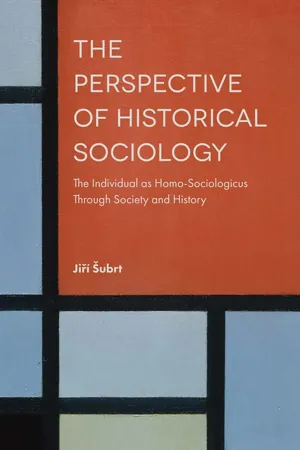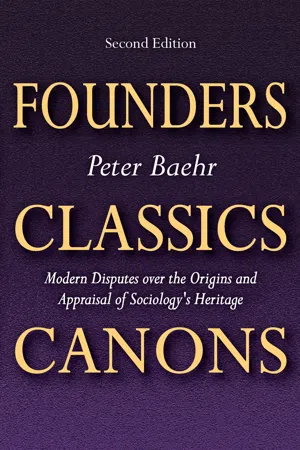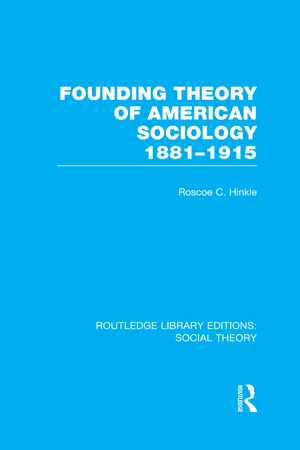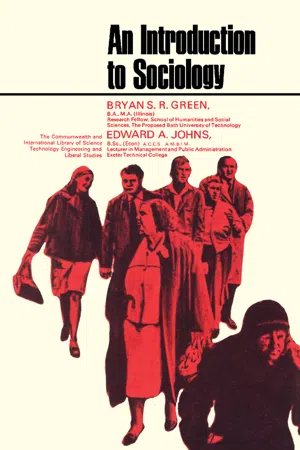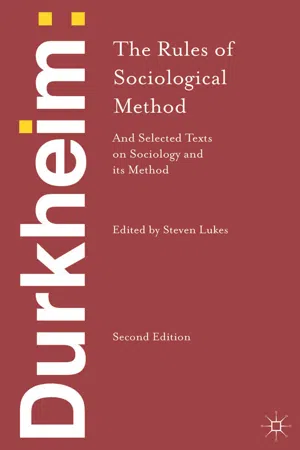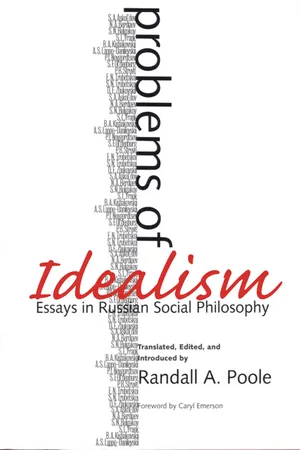Social Sciences
Founders of Sociology
The founders of sociology are key figures who laid the foundation for the discipline. They include Auguste Comte, often regarded as the father of sociology for coining the term and emphasizing the scientific study of society; Karl Marx, known for his theories on capitalism and class struggle; and Emile Durkheim, who focused on the study of social facts and the role of religion in society.
Written by Perlego with AI-assistance
Related key terms
1 of 5
9 Key excerpts on "Founders of Sociology"
- eBook - ePub
The Perspective of Historical Sociology
The Individual as Homo-Sociologicus Through Society and History
- Jiří Šubrt(Author)
- 2017(Publication Date)
- Emerald Publishing Limited(Publisher)
IIIIdeas of the Sociological “Founders”
In this chapter, we briefly survey the ideas of the Founders of Sociology which influenced the development of social sciences and humanities. Our aim is not to review the entire history of the sociological discipline, and thus we select a few personalities from the wide range of authors, directions, and schools that emerged in the 19th century and early 20th century whose work is truly essential and has inspired historical–sociological thinking since. In broad terms, this concerns Auguste Comte, Herbert Spencer, Karl Marx, Max Weber, and Emile Durkheim, although we will discuss a number of other thinkers who helped form the intellectual climate (Zeitgeist ) into which these great personalities emerged and to which they had to respond. Our account is also — perhaps not quite organically — distinguished by two thematic reflections. The first treats the rational handling of time, one of the main themes in the works of Max Weber; the other is devoted to the topic of collective memory, which originated from Durkheim’s theory of collective consciousness.Paraphrasing Isaac Newton, Robert K. Merton once expressed the idea that modern researchers are able to achieve their penetrating insight into the research problems that they examine mainly because they are standing on the shoulders of giants (Merton, 1985). These giants are the thinkers of previous generations, who created the foundations on which contemporary researchers build their knowledge. If we today see a little farther than they could, it is only because they provided us with our elevated viewpoint. Yet this need not mean following slavishly in a way set and determined by these greats, obediently echoing their footfalls. Indeed, quite the opposite: any really new knowledge is always a break with what went before, which must be overhauled. In other words, the long-term process of the development of knowledge is always a unity of continuity and discontinuity. - eBook - PDF
- Sara Delamont(Author)
- 2003(Publication Date)
- SAGE Publications Ltd(Publisher)
six the brotherhood of professors, males all the founding fathers of sociology T THE GRAND NARRATIVE The orthodox histories of sociology tell how the discipline was founded, and has been developed since the 1850s, by the brotherhood of pro-fessors, who were all men. The discipline of sociology began in the turmoil after the French Revolution, while Europe and then America were changing from rural, agricultural societies into urban, industri-al societies. The founding fathers were thinkers (empirical research came later) who debated what, if anything, made the new urban industrial societies function. They argued about the possibilities for social order in the new cities, unsure whether such societies could avoid breaking down into revolution, crime and immoral disorder. The origins of feminism lie in the same era, and the different schools of feminism have roots in exactly the same ideological debates among the same social classes in the nineteenth century. Insofar as there is an historical feminist sociology and/or a feminist challenge to the malestream sociology these, too, have roots as far back as the Enlightenment. All the malestream histories of sociology recapitulate that account, all without drawing the parallels with the history of femi-nism. Giddens (1971), Hawthorn (1976), Rhea (1981), Collins (1994a), Bottomore and Nisbet (1978a), Lee and Newby (1983), Craib (1997), Barnes (1995) and Scott (1995) all offer the same his-tory, as indeed did Aron (1965, 1967) in France. A detailed criticism of the ways in which women as topic, as scholars, and feminism as a theory or as a social movement are excluded is presented in Appendix 1. In the histories of sociology in the period from 1790 to 1920 the leading figures are French and German, only a few thinkers from the UK, Italy, and the USA appear in the accounts. - eBook - ePub
Founders, Classics, Canons
Modern Disputes Over the Origins and Appraisal of the Social Sciences
- Peter Baehr(Author)
- 2017(Publication Date)
- Routledge(Publisher)
Still, for the paradigm case of the social and collaborative nature of scientific innovation in sociology, we can do no better than return to Durkheim: an archetype of discursive, institutional and deliberative (see pp. 5-12 above) founding whose career, and its context, have been scrupulously documented by historians of the discipline.Institutional and Deliberative Founding: Durkheim and the Année SociologiqueAt least three types of condition—conceptual, cultural-political, and organizational—were responsible for the prominence Durkheim's sociology attained in France. The conceptual conditions comprise not just the traditions of thought that Durkheim assimilated and adapted—positivism, social liberalism, French neo-Kantianism, or-ganicism, solidarism, the moral realism of the German Kathedersozialisten ("Socialists of the Chair"), among others—but also the historical emergence of ideas that predated, but were pivotal to, his own understanding of sociology. The two most important ideas that Durkheim harvested were “society” and “religion.” Simplifying the much more refined discussion of John Bossy (1982) and Raymond Williams (1976: 243-247), we can say that the sense in which Durkheim employed these terms—to denote a real, unitary, essential object or thing from which all particularities can be abstracted— is of fairly recent origin: more precisely, it surfaces in a recognisably modern form during the late seventeenth century. Before that time, in both France and England, “society” and “religion” had typically referred, on the one hand, to an emotion or an active state of mind entertained by two or more individuals (e.g., a “reverent, worshipful or pious attitude to God,” a feeling of “companionship” and “fellowship,” Bossy [1982: 4, 8]) and, on the other, to an encompassing set of concrete human relationships to which people were symbolically and collectively attached (a religion, the Christian religion, French - Roscoe C. Hinkle(Author)
- 2020(Publication Date)
- Routledge(Publisher)
11 A basic synoptic characterization of founding theoryThe sociology of the Founding Fathers was explicitly and irrepressibly theoretical. They directly referred to ‘theory,’ social theory,’ sociological theory,’ theoretical sociology,’ or ‘general sociology.’ For Ward, Sumner and Keller, Giddings, Ross, Small, and Cooley, theory was regarded predominantly as a formal, deductive, or systematic enterprise. Either it was or it could and it should become a comprehensive, logically closed, deductive, integrative structure. Undeniably, theory ultimately had a practical or instrumental justification in terms of contributing to the resolution of social problems and (for most of the early sociologists) to the realization of social progress. But ‘founding theory’ was indispensable to sociology for it provided a necessary intellectual stature to the discipline and precluded any disposition to a precipitate identification with the practical amelioration of (urban) social problems.A basic, summary characterization of early or founding theory can be achieved by use of the analytic (i.e., the periodicizing-characterizing) scheme above. Early theory can be typified by its significance in relation to other concerns and (potential) sub-fields, by the relation of the divisions within theory to one another (i.e., epistemological-methodological division vis-à-vis the social ontological division or vice versa), and by the major features of each of the major realms within theory (i.e., first the traits of social epistemological-methodological theory, and then the characteristics of social ontological theory).The relation of general sociological theory to other concerns – subfields
Because general sociological theory is now regarded as one sub-field or speciality in the discipline, it might logically be inferred that the appropriate point of departure for characterizing early theory would be to examine its significance in relation to other sub-fields or specialties in that period. Unfortunately (for present purposes), sub-fields or sub-areas had not yet become clearly differentiated and achieved such condition only after World War I. Nevertheless, it is true that early or founding theory (as equatable substantially with ‘general sociology’) had a pre-eminence and stature which have never been re-attained or duplicated in any of the more recent periods of the discipline. It was, indeed, general theory which was believed to confer academic respectability on the discipline and to prevent the field from ‘degenerating’ into mere practical amelioration of social problems. General theory or general sociology sought to discover the first principles, causes, and laws of the origin, structure, and change of human association, human society, or social phenomena generically and irrespective of variant, particular, idiosyncratic, or unique forms. Irrespective of what they might be or become, all special (or specialized) sociology (or sociologies) were assumed to begin from, contribute, and eventually return to general sociology or general theory.- Roger E. Backhouse, Philippe Fontaine(Authors)
- 2014(Publication Date)
- Cambridge University Press(Publisher)
Even so, I would caution against assigning too much weight to the expanding number of sociologists alone since, as the next sec- tion will show, during the following historical period, while the number of sociologists held steady at a high level, the volume of research on the history of sociology sharply declined. Charles Camic 116 including Bourdieu (1977), Habermas (1984–7), and Joas (1985). Differing in their specifics, these works had in common the strong presentist ambi- tion to advance contemporary sociological theory by reappropriating soci- ology’s historical legacy. To this end, each of the theorists named came forth with a detailed exposition of the ideas of past sociological theorists – chiefly Marx, Durkheim, and Weber, with Georg Simmel, G. H. Mead, and Talcott Parsons occasionally appended to the recognized canonical trio – in order to construct from these sources what each author proffered as a superior paradigm (tellingly, a different paradigm in each instance) for sociology in the next stages of its historical development. Accompanied by a new generation of encyclopedic volumes (e.g., Bottomore and Nisbet 1978; Ritzer 1983; Turner 1974) 15 – volumes that surveyed a wide range of traditions in the history of sociological research and theory and then linked these traditions forward to ongoing disputes among later twentieth-century sociologists – the efflorescence of these vari- ous theoretical reconstructions had the pronounced effect of propelling the historiography of sociology away from the discipline’s periphery and repo- sitioning it at the core of some of the most lively mainstream debates. 16 By so doing, this rearrangement overcame (to some degree) the subfield’s pre- vious marginal position and raised its overall status among sociologists.- eBook - PDF
- Bryan S. R. Green, Edward A. Johns(Authors)
- 2013(Publication Date)
- Pergamon(Publisher)
1 COMMENTS OF THE FOUNDING FATHERS August Comte (1798-1857) Like Saint-Simon, with whom he associated as secretary and co-author, Comte saw the sciences as forming a hierarchy linked to the progressive development of human knowledge and the ultimate triumph of reason. At the summit of the hierarchy, there was to be a science of society called political science or social physics based upon historical observation and directed by the notion of inevitable human progress in controlling the social-physical environment. Society is seen as an entity having a reality apart from the individual; it is also more important than the individual because it is the historical embodiment of culture or civilization. The preservation of society demands not only a secular, political authority but also a spiritual authority. In the new, scientifically-based society envisioned by Comte the exercise of secular authority would be left to leaders of industry while spiritual authority would be vested in the wisest practitioners of social physics. They would be the priests of a new religion of humanity based upon a new morality of unselfish love and unquestioning obedience to authority. Before the task of building the new society could begin, how-ever, the laws governing the development of society had to be formulated. It is interesting to note that while Comte advocated scientific observation, on the model of physics or chemistry, he rejected the application of statistics in social science. So adamant was Comte on this point that he coined the word sociology to replace social physics because the latter had been used by the Belgian statistician Quetelet as the title of a book. In his programme of study Comte distinguished between social 1 The general outline of the discussion is taken from A. Inkeles, What Is Sociology?, New York, Prentice-Hall, 1964. THE SUBJECT MATTER OF SOCIOLOGY 59 statics and social dynamics. - eBook - PDF
- Syed Farid Alatas, Vineeta Sinha(Authors)
- 2017(Publication Date)
- Palgrave Macmillan(Publisher)
In the first instance, his books were translated into English through the efforts of American sociologists and thus introduced his ideas to English-reading audiences the world over. The intention here is neither to essentialize Durkheim’s ideas nor to 2 LaCapra, Emile Durkheim, 116. 172 V. Sinha distil the ‘real’ sociologist in him. The presentation of his work is neces- sarily selective and focused on the following: his crafting of a methodology for Sociology and his analysis of the emergence of modernity. A General Outline of Durkheim’s Sociological Theories Durkheim established Sociology as a distinct, independent discipline and helped to institutionalize it. Auguste Comte coined the term ‘Sociology’ but its legitimization and formalization of it within French academia was Durkheim’s life work. Alongside the formaliza- tion of Sociology, Durkheim founded an important journal, l’annee Sociologique in 1898. An intellectual circle was formed around this periodical and a total of 12 volumes were published under Durkheim’s stewardship. The primary aim of the journal was to explore and investigate the relationship between society and morality. In his first published article in this journal, Durkheim stated: ‘[o]f all the various branches of Sociology, the science of ethics is the one which attracts us by preference and which will command our attention first.’ 3 This statement was an early but defining feature of all of Durkheim’s sociological inquiries. His aspiration was to use this journal to articu- late and demonstrate what Sociology could and must become. From the outset, Sociology (coupled with the methodology of science and an awareness of moral questions) was for Durkheim a discipline with a critical and reforming mission. While his contributions to developing Sociology in France are well known, his role in helping to institutio- nalize the Sociological Society in London is less known. - eBook - PDF
Durkheim: The Rules of Sociological Method
and Selected Texts on Sociology and its Method
- Emile Durkheim, Steven Lukes(Authors)
- 2013(Publication Date)
- Bloomsbury Academic(Publisher)
For example, the division of labour and the specialization of functions, are these not to be found in the science of marriage, the science of the family, and even in the science of religions? What is the note between priests and their flock save a form of the division of labour and the specialization of functions? The same holds good for the other socio-logical sciences. Other economic laws which are applicable are the law of supply and demand and the law of capital. The speaker said that he could not end this brief exposition on sociology without saying a few words about Auguste Comte, who is held to be the founder of this science. But Auguste Comte did not create it, for it still does not yet exist. At the risk of causing a scandal, Limousin claims that Auguste Comte was not a scientist in the sense of a man who knows about natural phenomena. He who deprecated metaphysics was solely a metaphysician, a metaphysician in the same category as the mystics, as he demonstrated by the creation of a religion whose key dogma was the symbol of the ‘Virgin Mother’. Auguste Comte was not a sociologist, although he was the inven-tor of this defectively formed word. He was a socialist, for his ‘sociocracy’ is not an objectively constructed system concerning the state of present or past societies, but a Utopia in the style of those of Saint-Simon, Fourier, Pierre Leroux, Cabet, Le Play, etc. The speaker did not dispute that he [Comte] made some interesting remarks with the aim of buttressing his system. In particular, there is his basic theory, termed positivism; but if he had had the honour of formulating it, it may be said that it had been in the air since the end of the eighteenth century, since the time of Lavoisier. If Auguste Comte had not done so, someone else would have formulated it, because it was imperative to do so. Other socialists of the same era have also made discoveries: Fourier, Saint-Simon and Pierre Leroux in particular. - eBook - PDF
- Edward A. Purcell(Author)
- 2003(Publication Date)
- Yale University Press(Publisher)
IO The Basic Principles ofAuguste Comte's Sociological Doctrine A. S. L A P P O -D A N I L E V S K I I Introduction In the course of the first decades of the nineteenth century, enthusiasm for the scientific spirit was perhaps nowhere as strong as in France: there science was enriched by a number of new fields of knowledge and acquired great popularity. At the same time, however, French society during the Resto-ration began to react against the excesses of individualism and revealed a clear inclination for the establishment of some type of spiritual authority. Such an attitude was felt not only by reactionaries, but also by progressive people, who believed that the time had arrived for the reorganization 1 of the social order. They included, for example, the ardent admirer of science and bold precursor of socialism, Saint-Simon; 2 not able to focus his lively mind, he did not, how-ever, create anything whole and finished his versatile literary activity with his famous discourse on the principles of a new Christianity. 3 Auguste Comte, an associate of Saint-Simon for a time, 4 must be recognized as a much more systematic representative of the new attitude. A profound faith in the all-encompassing significance of science and a strong desire for the moral renewal of society permeate all Comte's philosophy: his Cours de philosophie positive vividly reflects the basic currents dominant in French thought since the second half of the eighteenth century, and represents one of the first attempts to 356 Comte's Sociological Doctrine 357 construct a logic of the individual sciences. And his Systeme de politique positive resounds with the convinced voice of someone calling people to fulfill their moral duty, of someone proclaiming a religion of humanity.
Index pages curate the most relevant extracts from our library of academic textbooks. They’ve been created using an in-house natural language model (NLM), each adding context and meaning to key research topics.
